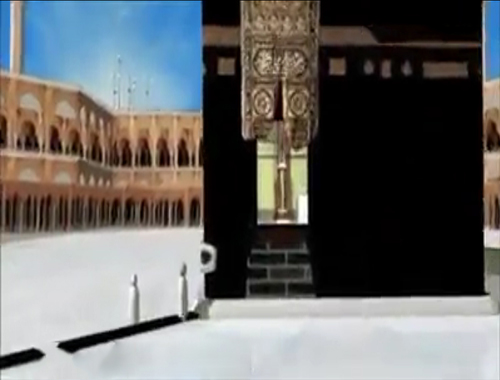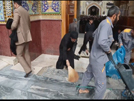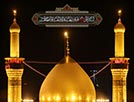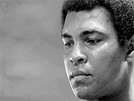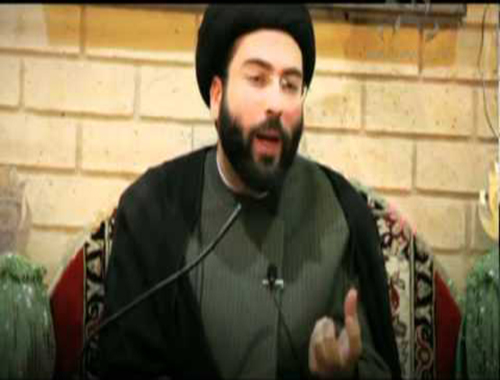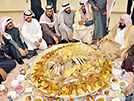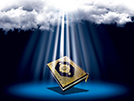Articles
The Arguments for the Sealing
- Details
- Hits: 2687
The Arguments for the Sealing
of the Prophecy
Introduction
It is necessary to have faith in all of the Prophets and their messages, so any denial of a Prophet, a decree or a message of him represents a refutation of the divine legislative sacredness and is similar to the Satan’s disbelief.
Therefore, it is necessary to accept as true the messengership of the Holy Prophet of Islam (p.b.u.h.), and whatever has been revealed to him as well as and all the decrees which he has brought from Allah.
However, to believe a Prophet or his heavenly Book does not involve acting according to his divine legislation. Even though Muslims have faith in all of the Prophets and their heavenly Scriptures, they cannot and should not follow their previous legislations. For every people’s practical duty is to act according to the decrees of their own Prophet. Moreover, the vitality of following the legislation of Islam by all people can be established if the Holy Prophet’s (p.b.u.h.) Prophethood is not limited exclusively to a certain people (like the Arabs), and if no other Prophet has been sent after him to abrogate his legislation. In other words, Islam should then be the universal and eternal religion.
Qur’anic Arguments for the Universality of Islam
The best argument and most reliable evidence for the verification of this issue is the Holy Qur’an. Anyone who leafs through this Divine Book will clearly find out that its call is general and universal, and does not exclusively relate to a certain people, race, language or group.
The Holy Qur’an calls people in many of its verses thus:
يَا أَيُّهَا النَّاس
“O Mankind” and
يَا بَنِي آدَم
“O Children of Adam!”
It has considered its guidance to include all the humans (mankind and creatures ). Furthermore, in many verses it has proved that the Holy Prophet’s (p.b.u.h.) messengership embraces all the people (mankind and creatures ). In another verse it has emphasized the inclusiveness of its call in regard to every one who gets familiar with it. Besides, it has called and reproached the followers of the other religions as “the people of the Scripture” , and has considered the main purpose of the revelation of the Holy Qur’an to the Prophet (p.b.u.h.) to prevail over the other religions.
Based on these verses, there remains no room for any doubt about the inclusiveness of the call of the Holy Qur’an and the universality of the holy religion of Islam.
The Eternality of Islam
The foregoing verses substantiate the inclusiveness and universality of Islam through applying such general terms as ‘mankind’, ‘people’, and ‘creatures’ and through directing the call toward the non-Arab people and the followers of other religions with such expressions as
“O people of Scripture”. Likewise it cancels out the limitation of its call to a specific time through timeless expressions, as is the case with the following part of the Qur’anic verse that leaves no place for doubt in this regard:
لِيُظْهِرَهُ عَلَى الدِّينِ كُلِّهِ
“that He may make it conqueror of all religion.”
Also, the following verse can support our claim in this regard:
وَإِنَّهُ لَكِتَابٌ عَزِيزٌ * لا يَأْتِيهِ الْبَاطِلُ مِن بَيْنِ يَدَيْهِ وَلا مِنْ خَلْفِهِ تَنزِيلٌ مِّنْ حَكِيمٍ حَمِيدٍ
“Indeed it is an august Book: falsehood cannot approach it, from before it nor from behind it, a [gradually] sent down [revelation] from One all-wise, all-laudable.”
This verse reveals that the Holy Qur’an will never lose its reliability and validity. Furthermore, the reasons for the fact that the Holy Prophet of Islam is the Seal of Prophecy cancel out any misconceptions about the abrogation of this divine religion by another Prophet or religion:
حلال محمد حلال الى يوم القيامة, وحرامه حرام الى يوم القيامة
“Anything announced as permissible by Muhammad will remain permissible up to the Day of Resurrection, and anything announced as prohibited will remain prohibited up to the Day of Resurrection, too.”
Besides, the eternality of Islam, like its universality, is a necessity for this divine religion, and there is no further need to verify the legitimacy of Islam.
Considering the eternality of Islam, the probability of the appearance of another Prophet to abrogate Islam is negated; however, such misconception may remain to the effect that it is probable for another Prophet to come in order to propagate and disseminate Islam, in the same way as many of the former Prophets were charged with the same responsibility, some of whom were contemporary with the Prophet who had a code of sacred laws like Lot, who was a contemporary with Abraham, and was a follower of his religion, while some others rose after the Prophet who had a code of sacred laws and they followed him, like many of the Prophets of the Children of Israel. Therefore, the issue of the Holy Prophet being the Seal of Prophecy should be dealt with separately so that there remains no place for such a misconception.
Qur’anic Evidence for the Seal of Prophecy
One of the necessities of Islam is that the chain of the Prophets has been sealed by the Holy Prophet of Islam (p.b.u.h.), and no other Prophet would come or will come after him. Even the outsiders know that this issue is among those Islamic beliefs in which every Muslim should have faith; therefore, like the other essentials of the religion, it needs no evidence. Meanwhile, this point can be inferred from both the Holy Qur’an and the uninterruptedly transmitted traditions.
The Holy Qur’an states that:
مَّا كَانَ مُحَمَّدٌ أَبَا أَحَدٍ مِّن رِّجَالِكُمْ وَلَكِن رَّسُولَ اللَّهِ وَخَاتَمَ النَّبِيِّينَ
“Muhammad is not the father of any man among you, but he is the messenger of Allah and the Seal of the Prophets.”
Here the Holy Qur’an openly regards his Majesty as the Seal of all Prophets.
Some of the enemies of Islam have raised two objections in regard to the relation of this verse with the Holy Prophet’s being the Seal of Prophecy:
First, the term ‘khatam’ in Arabic has also been used to mean ‘ring’; so, in this verse it may have been applied in the same sense.
Second, even if ‘khatam’ has been used here to mean ‘seal’, the purpose is that the Holy Prophet is the Seal of ‘Prophets’, not the Seal of ‘Messengers’.
The answer to the first objection is that ‘khatam’ refers to a means of sealing (what is used to seal things with);
ما يختم به الشيء
the ring has been called ‘khatam’ because it was used to seal letters and similar things with it. The answer to the second question is that every Prophet who is assigned as a messenger also possesses the station of Prophethood, and through sealing the chain of the Prophets, the chain of the messengers is also sealed. Furthermore, although the concept of ‘Prophet’ may not be wider than that of ‘messenger’, the Prophet is wider than the messenger in terms of extension and cases.
Traditional Evidences for the Sealing of Prophecy
The issue of the Holy Prophet’s Seal of Prophecy has also been emphasized and referred to in hundreds of traditions, among which one can refer to the hadith of ‘manzilat’ (station). This tradition has been widely and uninterrupted narrated from the Holy Prophet (p.b.u.h.), so there is no doubt about its issuance. It says:
“When the Holy Prophet moved from Medina for the battle of Tabuk, he left Ali (p.b.u.h.) and assigned him to take care of the Muslims’ affairs. His Majesty got sad about being deprived of the honor of taking part in this battle, and his eyes were filled with tears. The Holy Prophet (p.b.u.h.) said to him:
اما ترضى ان تكون مني بمنزلة هارون من موسى الا انّه لانبي بعدي
“Do you not like to be for me as Aaron was for Moses?”
Then, in order that no misconception should rise, the Holy Prophet (p.b.u.h.) added: “except that there is no Prophet after me.”
In another tradition, the Holy Prophet is reported to have said:
ايها الناس, انه لانبي بعدي ولا امة بعدكم...
“O people! There is no Prophet after me, and there is no other community (ummah) after you.”
Still in another tradition, he thus states:
ايها الناس, انه لا نبي بعدي ولا سنة بعد سنتي...
“O people! There is no Prophet after me, and there is no Sunnah (lit. normative rule) after my Sunnah.”
Furthermore, in the traditions and supplications narrated from the infallible Imams (p.b.u.h.), this fact has been emphatically remarked on, the discussion of which is beyond the scope of this paper.
The Secret of the Sealing of Prophecy
The wisdom behind the multiplicity and sequence of the Prophets is that in the past the propagation of the divine mission all over the world and among all people on the part of a single person was impossible; besides, the development and complexity of the relations and appearance of new social phenomena necessitated legislating new laws or changing the existing laws; furthermore, as a result of ignorant or intentional intervention of some individuals or groups, gradually distortions and transformations took place, which necessitated divine instructions and teachings through other Prophets.
Therefore, when it is possible for a single Prophet, his assistants and his successors to communicate the divine mission, when the decrees and laws of a religion are capable of meeting the present and future needs of a society, when the necessary anticipations for dealing with the new issues have been made in that religion, and when the delivery and immunity of the religion from distortions are guarantied, there will be no need for the appearance of another Prophet.
However, these conditions may not be realized through the common people’s knowledge, and it is the Most High, Allah, who recognizes its right time through His endless knowledge, and it is Him who can announce the Seal of Prophecy, as He has stated in His last heavenly Book.
Yet, the Seal of Prophecy dose not mean the discontinuation of the guiding relationship between Allah and His servants; whenever the Most High, Allah wants, He is able enough to grant unseen knowledge to his deserved servants, even if it is not in the form of “Prophetic revelation”, in the same way as the Imamis believe such knowledge has been granted to the infallible Imams (p.b.u.t.).
The Answer to a Paradox
Based on this, it becomes clear that the secrets of the Seal of Prophecy are first, that, the Holy Prophet of Islam (p.b.u.h.) could communicate his mission to the world with the assistance of his companions and successors; second, the immunity of his heavenly Book from any kinds of distortion has been guarantied; third, the religion of Islam is capable of meeting all the needs of humanity up to the end of the world.
However, one may raise the following question about the foregoing point, thus: in the past the ramification of the social relations necessitated legislating new laws or changing them; therefore, new Prophets were sent; likewise, after the Holy Prophet of Islam (p.b.u.h.), considerable changes have taken place and social relations have got ramified. Then, how could it be realized and explained that such kinds of changes would not necessitate a new religion?
In response it should be mentioned that: as it was mentioned before, an ordinary human being cannot realize what kind of changes would necessitate the transformation of foundational laws, because we are not aware of the reasons for and the wisdom behind the laws; however, based on the reasons for the eternality of Islam and the Holy Prophet’s Seal of Prophecy (p.b.u.h.), we could discover that there will be no need for the transformation of foundational laws.
Of course, one cannot deny that the development of some new social phenomena involves the legislation of some new laws; however, in relation to the religion of Islam in order that such minor regulations would be legislated, certain principles and regulations have been applied, based on which authoritative scholars are capable of legislating necessary regulations and execute them. The details of the issue should be studied in the discussions related to the authorities of the Islamic rule (ie the infallible Imam (p.b.u.h.) and the supreme authority in jurisprudence).

